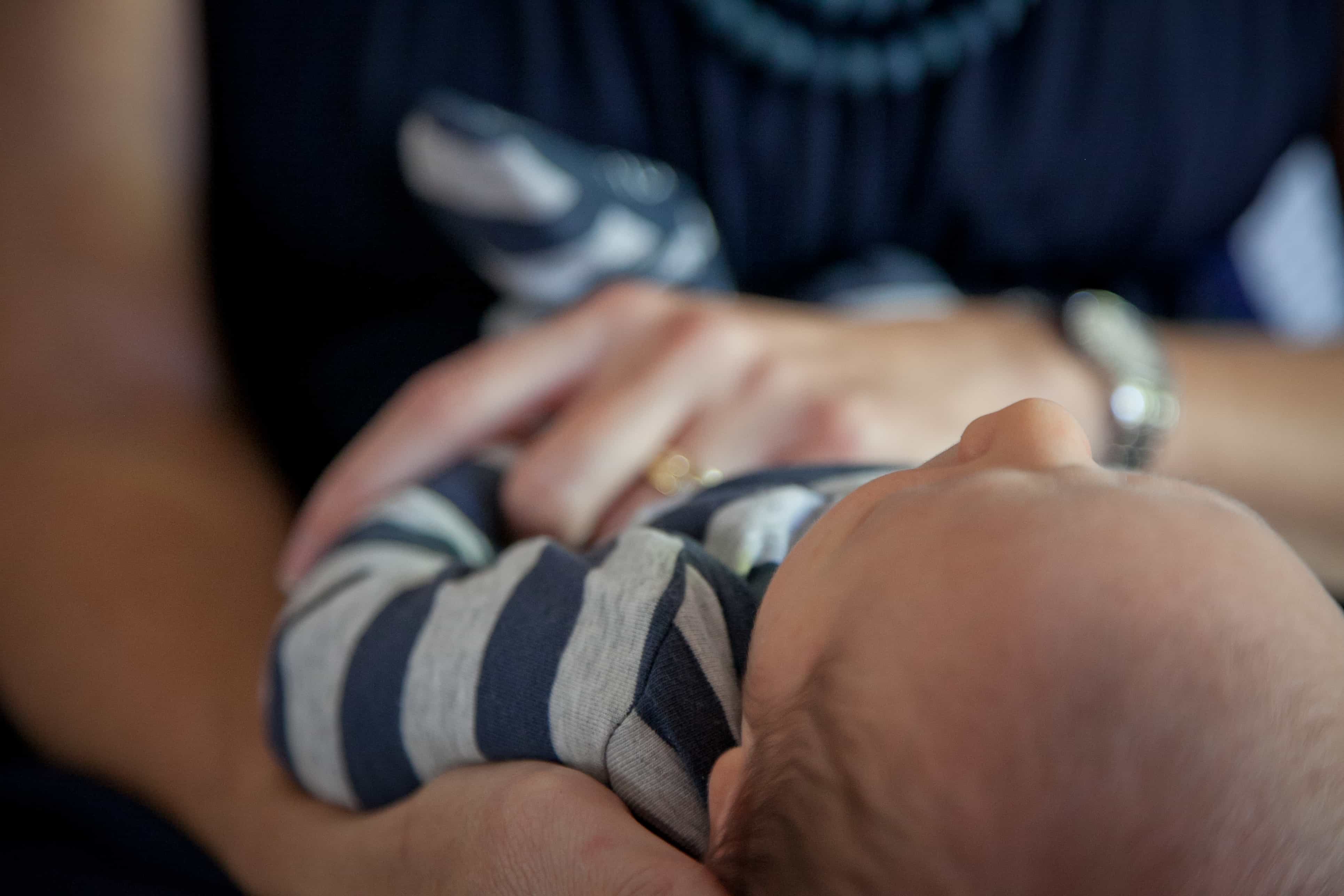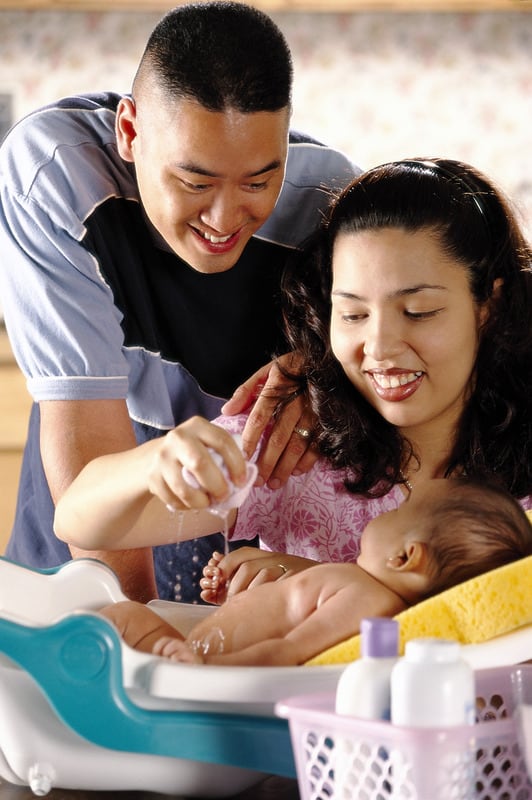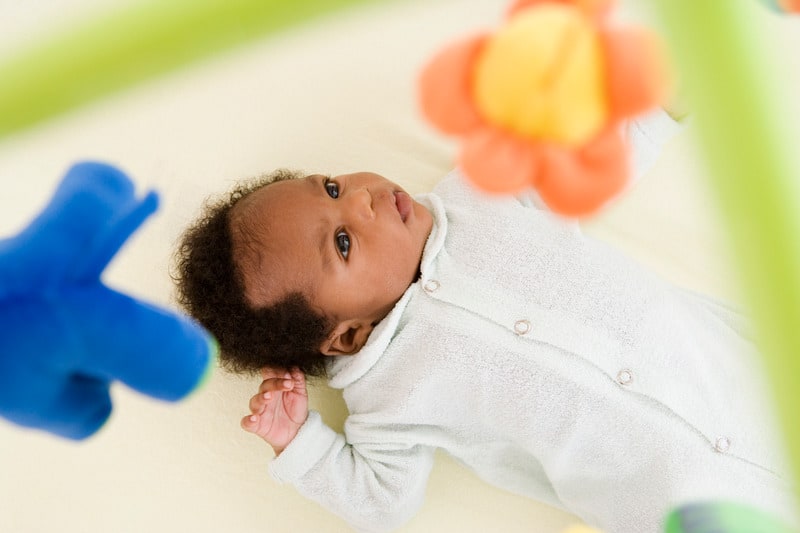Newborn Baby Tips: All of Your Questions Answered
Perhaps having a new baby is something like getting a new car. It’s been a long wait. Now, everyone wants to look, listen, touch, turn, and look again to be sure that the parts are there and working properly. More than likely, everything is in order. The amazing thing is that everything works perfectly most of the time! Below are some newborn baby tips that we feel are commonly asked questions. Look things over and ask about anything you happen to wonder about. This is better than worrying about something that may be perfectly normal.

Newborn Baby Head Shape: What’s Normal?
Maybe. It often is. To begin with, a baby’s head is large in proportion to the rest of the body and seems to sit on the shoulders without much of a neck. If a baby’s head were solid, birth would be very difficult. So actually, the head is made up of several bones that can give and take during birth. They don’t join together until later. Thus, the head is shaped longer, rounder, or flatter depending on the baby’s position during birth. At first, the forehead is often quite flat and sloped toward the back. Ridges and bumps can be felt where the bones overlap a little. Quite a bit of natural reshaping occurs in the first few weeks.
How Many Soft Spots Does a Newborn Baby Have?
There are two soft spots (fontanels) which are placed on the head where the bones have not yet come together. The posterior one is quite small and disappears rather soon, but the diamond-shaped fontanel on top of the head takes one to one-and-a-half years to close. It is safe to touch it, and don’t be afraid to wash the area at bath time; you won’t hurt anything.
How Much Does My Baby See?
A baby can distinguish light from dark and can see large objects at a distance of a cuddle. It will be some time before much focusing and consistent eye alignment occurs. It is completely normal for your newborn baby to be unable to focus on your face. Consistent, coordinated eye movements take a few months to develop.
Can My Baby Hear?
Yes. You will notice that the baby responds to loud voices and noises often with a startle. Quiet music or a sound machine set on white noise can be soothing to a baby.
Newborn Baby Hiccups And Burping: Is This a Bad Sign?
Not at all. Most healthy new babies have periodic episodes of hiccuping which can last minutes to hours, and cause no difficulty at all. They can also sneeze several times in a row.
Why Does The Baby’s Breast Look Large?
Breast enlargement in a baby girl or boy is caused by a hormone from the mother. There is no cause for concern even when a little milk-like discharge is produced. The swelling goes down soon enough. Sometimes there are also white spots on the nipple.
Newborn Feeding Schedule: Why Didn’t My Baby Eat at Feeding Time?
Most babies are very sleepy for the first few days. If your baby does not wake up for feedings, wake the baby every 2-3 hours during the day and every 4 hours during the night, until your doctor tells you otherwise. Eventually, your baby will demand feedings on a regular basis.
How Do I Know If My Baby Is Hungry?
While crying can signal a hungry baby, there are other signs you can look for that occur before the baby starts to cry. Rooting, which is when a baby starts to search for a nipple with his mouth, is a sign of hunger, as well as putting his hands in his mouth. Try to notice these early signs, you may encounter an easier time feeding.

Does Crying Hurt My Baby?
It all depends on what’s going on. Some mothers won’t let their babies cry for a single minute. They drop everything and run at the first whimper, while others can tolerate more crying. On the other hand, crying may mean “Hey, mom, I’m wet.” or “How about changing this messy diaper?” or “I’ve been swallowing some air and have a tummy-ache. Sit me up in your arms and burp me.” All babies are going to do some crying. And remember some babies cry a whole lot more than others. Most healthy babies will cry three to four hours a day.
Breastfeeding My Baby: Can I Do It?
Sure! Just remember, breastfeeding is not a reflex for you or your baby. It is a process that must be learned and your success depends on receiving and utilizing correct information. Lots of well-meaning people will offer advice. Discuss it with your doctor to find what works best for you and your family. We have lactation nurses in our office who are excellent resources as well.
Am I Making Enough Milk During Breastfeeding?
In the first few days, your body produces colostrum, which is all your baby needs the first few days of life. As your milk comes in during days 3-5, you will notice your baby swallowing more and having more frequent wet diapers and stools. Breast size has nothing to do with the amount of milk production. There are some women who cannot make enough milk. Advanced maternal age, some types of breast surgery, or hormonal issues can lead to decreased milk supply. If you are concerned that your baby is not getting enough milk, you should contact the office for a weight check.
Breastfeeding Diet: What’s Best?
A normal well-balanced diet with lots of liquids is best. Thirst guides most nursing mothers to want to drink about three quarts of fluid each day. Most anything can be eaten by a nursing mother, in moderation. Check with our lactation consultant before taking any medicines, as some may affect a nursing baby.
How Long and How Often Should A Breast-Fed Baby Nurse?
Each baby’s suckling is different. Some babies will eventually nurse for 3-5 minutes on each breast, others may continue nursing for 15-20 minutes on each breast. Babies need feeds every 2-3 hours during the day, every 3-4 hours during the night. It is not recommended to nurse for longer than 20 minutes on each breast. Once the milk is in, the baby should be eating 8-12 times per day. You will know the baby is getting enough to eat if he or she is having bowel movements and wet diapers and seems satisfied after feeding. If your baby falls asleep after one breast, try switching to the second breast while he’s still awake and sucking well (after 5-7 minutes).
How To Start Breastfeeding?
You need to be comfortable and relaxed and the baby must be awake. Hold the baby’s body facing you and stimulate the baby’s lower lip with your nipple. As the mouth opens, bring your baby to your breast and insert your nipple with as much areola as possible into the baby’s mouth. With baby’s head in the crook of your arm and your hand holding baby’s buttocks, gently pull baby close to your body. Holding the baby in this position keeps the baby’s nasal airway open without pulling the breast away from the nose.
Breast And Nipple Care While Nursing
The areola has lubricating glands which function best when no lotion or cream is applied to them. Do not use soap or other drying agents on your nipples. Air drying or blowing nipples dry with a hairdryer works well. Wear a well-fitted, comfortable bra. If leaking milk is a problem, wear nursing pads without plastic liners and change them often. If your breasts become dry or cracked, over the counter pure lanolin is an option. Lactation consultants are available in our practice to help you with any issues.
How To Relieve Pain While Breastfeeding?
Make sure the latch is correct with as much areola in the baby’s mouth as possible. Some tenderness with the initial latch is normal. If this persists more than a few seconds, remove the baby from the breast and reposition him. Hold in different positions (cradle or football) to feed. To prevent painful engorgement (where your breasts are very full, hard, hot), nurse the baby as frequently as possible for several days when your milk first comes in. If your breasts are engorged, you can use ice packs wrapped in a towel for 15 to 20 minutes between feedings. Just before feeding use warm compresses on nipple-areola. Engorgement usually lasts from 1-3 days.
Newborn Baby Formula: Is It Noursishing Enough?
Certainly. Much progress has been made in producing excellent formulas for babies.

How To Prepare Your Newborn Baby’s Formula
The formula is available in ready-to-feed, concentrate or powder. Any of these are fine to use. Unless special instructions are given to you, follow the directions on the formula container. Read the instructions carefully, as some formulas come supplied in several different ways. Remember that once a formula is opened, it must be refrigerated. You should boil the water for formula preparation if you use well water or are concerned about the safety of your tap water. Otherwise, it is fine to use regular tap water for preparing the formula. Bottles and nipples may be washed in hot soapy water or run through the dishwasher. Sterilization is not necessary. It is not necessary to warm up a bottle before feeding. Room temperature milk is just fine. If you do heat bottles, heat in a warm water bath. Do not heat bottles in the microwave as there may be hot spots in the bottle.
How Much Baby Formula Does My Baby Need?
A good rule of thumb is to feed baby no more than one ounce per hour since the last feeding for the first few weeks. In fact, a baby can do without any feedings for the first two days of life. So don’t push more than a baby seems to want, and don’t worry about giving enough. A couple of ounces at a time may be plenty and not more than three or four ounces at a time for the first month. Put 2-3 ounces of formula in each bottle at first and gradually increase the amount as the baby takes more.
Does My Baby Need To Drink Anything Else Besides Breast Milk & Formula?
No. Water isn’t needed and doesn’t supply any calories.
How To Hold A Baby When Bottle Feeding?
Hold your baby snugly so baby experiences a warm and happy feeling. Touching the nipple to the lips of a hungry baby is usually enough to get the mouth open. Slip the nipple all the way in. Then hold the bottle so the nipple stays filled with milk. For many reasons, never leave a baby with a bottle propped in his mouth.
How To Burp A Newborn?
When a baby stops nursing for a few moments, it’s time to burp a bubble of air from the stomach. Gentle patting with baby over the shoulder or moving to-and-fro in a sitting position helps the air find its way out. Whenever air is swallowed, at feeding times or in between, burping is comforting. You may also rest the baby forward while supporting the neck/head between your index finger and thumb while patting on back with the opposite hand. Remember, there will be times when your baby will be unable to burp, despite your best efforts. If you try for more than five minutes and are unsuccessful, it is okay to stop trying.
What Does A Normal Baby Poop Look Like?
Stools will be semi-formed to formed. Expect 1-3 stools per day for the first few weeks then 1 per day or 1 every 2-3 days. A newborn’s first few stools look like sticky greenish-black tar (meconium). Then the stools become greenish-yellow with a seedy consistency. Gradually the more typical yellow color is reached, with quite a bit of variation depending on what the baby is fed. Stools can be any shade of orange, yellow, green or brown without causing any concern. If your baby has a very white stool, bloody stool, or black tarry stool after the first few days of life, it is important to let your doctor know. As time goes on, the number of stools per day decreases. It is normal for the baby to cry, push, turn red and draw up legs when passing a stool.
Will I be Getting Up Every Night With My Baby?
Probably for a while. How long is hard to predict. Some babies skip night feedings sooner than others.

Bathing My Newborn
Sponge bathing is best at first. When the cord comes off, real baths are fun. Bathe with a mild soap. Washing off after messy diapers keep baby sweet and clean.
When Does The Umbilical Cord Come Off?
The umbilical cord, no longer being necessary, begins drying up right after being cut at birth. The remaining part will drop off in 1-3 weeks.
How Do You Care For The Cord & Navel?
You can leave it alone unless it begins to have a foul odor, and in that case, you can use an alcohol swab to clean around the outer edges. Do not be afraid to lift and move the cord, it will not come off prematurely. Try to fold the diaper below the cord to keep it dry. When the cord comes off, a little moist secretion and a few drops of blood may be present. However, a significant amount of drainage (especially with a bad smell), redness around the cord base, or tenderness is cause for concern, and you should notify your doctor right away.
How To Care For My Newborn After A Circumcision?
Keep the area clean. A little petroleum jelly may be desirable to reduce irritation for the first week. The plastibell (plastic ring around the penis) should be left alone and will fall off around 5-10 days after the circumcision was done. After the first week, the foreskin should be pushed back toward the body and washed every day to avoid adhesions.
How To Care For My Newborn Uncircumcised?
If uncircumcised, clean by retracting foreskin as far as it will easily move, do not force it back.
What Is The Proper Care For My Babies Genitalia?
It is important to separate the labial folds when washing a baby girl. Otherwise, the two sides may stick together forming adhesions. These adhesions have nothing to do with the hymen. Do not worry if you are unable to remove all the vernix, the sticky white substance left after birth that can be quite adherent to the skin, from the folds. Incidentally, a little vaginal secretion and even bleeding may occur which is no cause for concern. This is another quickly passing effect of the mother’s hormones.
Baby Diaper Rash Creams: What Should I Use?
Water-repellant zinc-based diaper creams or ointments may be used, such as Desitin or Aquaphor.
Newborn Baby Skin: Is Color Change A Concern?
No. A baby’s skin may from time to time appear mottled. This pink and white pattern may come and go without worry. A baby’s skin is often dry and may peel the first few weeks.
Do I Need To Clip My Babies Fingernails?
Are the fingernails long? Is baby scratching himself (or you)? If so, trim the fingernails with small, blunt-end scissors, being very careful not to cut the skin which surrounds the nail. Filing the nails may be easier.
Fussy Newborns
New babies are fussy, and crying is expected, often in the evening. If burping or other simple comforting measures does not solve the problem, discuss it with your doctor. Don’t forget that soothing music often helps calm the baby and everyone else. Swaddling a baby or gentle movement may be helpful for infants less than 2-3 months of age. The 5 S’s can also be helpful: swaddle, holding your baby on the side or stomach, shushing, swinging, or sucking on a pacifier.
How Much Newborn Clothes Do I Need?
How much clothing do you need to be comfortable today? That’s enough. In other words, your baby should be dressed in clothing appropriate for the weather. Keep the house temperature and activity as you’re used to it.
Will My Baby Lose Weight The First Couple of Days?
Yes, weight loss in the first several days of a baby’s life is normal and expected, but the birth weight is almost always regained within the first couple of weeks.
Will The Pink Marks On the Eyelids Go Away?
These light pink blotches will eventually disappear, but it may take some time.
Should Matted Eyes Be Washed?
Yes, with plain water and a clean washcloth.

Where Should My Baby Sleep?
Babies should sleep in their own cribs or bassinets at bedtime. The recommendation is that they are placed on their back to sleep. Allow tummy time during awake periods with an adult present.
Is Jealousy Of A Newborn Inevitable?
If you had been in the center stage spotlight and were suddenly displaced, would you like it? Neither does a two-year-old, or a child of any age, who suddenly feels unimportant. Sometimes even a father feels a little jealous about all the attention the baby is getting. But by making each family member feel important, and a part of the event, the changing family unit will become the new normal.
When Can My Baby Go Out?
The baby may go out when the mother is able but avoid crowds for the first 4 weeks of life. Use a safety-approved rear-facing car seat when the baby is riding in the car. Avoid contact with sick adults and children.
That’s it for the first of many questions, but you can be sure that as the years go by, there will be thousands more. Finding the answers is going to be fun, although sometimes a challenge, but that’s what life is all about.
If you have any questions regarding infant care you can count on us pediatric doctors for answers. We have locations in both Dallas and Plano, are open nights and weekends to answer all of your new parent questions!
